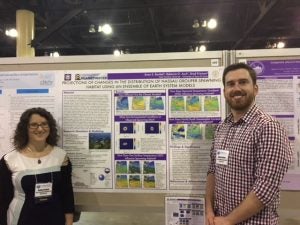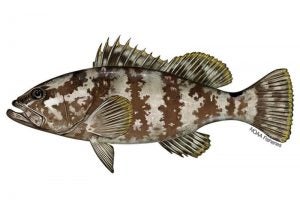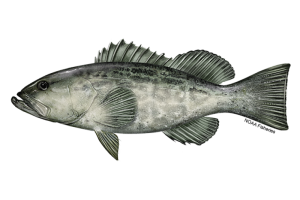ECU CRM PH.D. Student Brian Bartlett Leads the Charge on New Fisheries Research Project

How will changing climate impact the range and reproductive success of fish species? According to ECU Coastal Resources Management Ph.D. student Brian Bartlett, that is “the great conservation question” and a driving inquiry of his most recently funded research project.
Almost a year ago, Bartlett and his advisor Dr. Rebecca Asch (both pictured right), along with Dr. Cheryl Harrison, a colleague from Louisiana State University, applied for a grant from the NOAA Climate Program Office. Just this month, they were notified that their proposal, “Climate Change Impacts on Reef Fish Spawning Aggregations, Larval Dispersal, and Settlement in Southeastern U.S. National Marine Sanctuaries and Surrounding Areas”, had been selected and would be awarded $445,000 over the course of three years.

The Nassau Grouper is one of three species to be targeted for the new study. Illustration courtesy of NOAA Fisheries.
With the initial excitement of the news now settling down, the team now seeks to better understand how climate change may influence the reproductive success- specifically spawning aggregations- of Black Grouper, Nassau Grouper, and Mutton Snapper, in three National Marine Sanctuaries: Gray’s Reef, Florida Keys, and Flower Garden Banks. Bartlett and his colleagues will utilize climate models and identify spawning habitat to provide insight as to how effective these marine protected areas will be for the three species as the climate shifts.
While each fish species tends to prefer certain types of habitat characteristics, the research team believes their methods will be applicable to similar studies in the future all over the world, including off the coast of North Carolina. This specific project is broad enough that it will have implications across the fields of biology, oceanography, ecosystem-based management, economics, and more- something that Bartlett sees as a strength of the project.

The Black Grouper is another one of the three species to be targeted for the new study. Illustration courtesy of NOAA Fisheries.
“This isn’t a study just for the sake of science. It will be applicable,” he states. “This work will support management in these National Marine Sanctuaries by providing better insight into metapopulation structure and distribution of reef fish species under changing climatic conditions.”
In layman’s terms, when complete, the study will be able to inform sanctuary managers of what may lie ahead in the wake of climate change, and how the managers might best respond to best protect these key reef species.
For now, Bartlett is excited to get his feet wet with this new facet of his Ph.D. His dissertation was already focused on Nassau Grouper and marine protected areas, so this additionally funded project will no doubt provide him with insight as he completes his degree within the next few years.